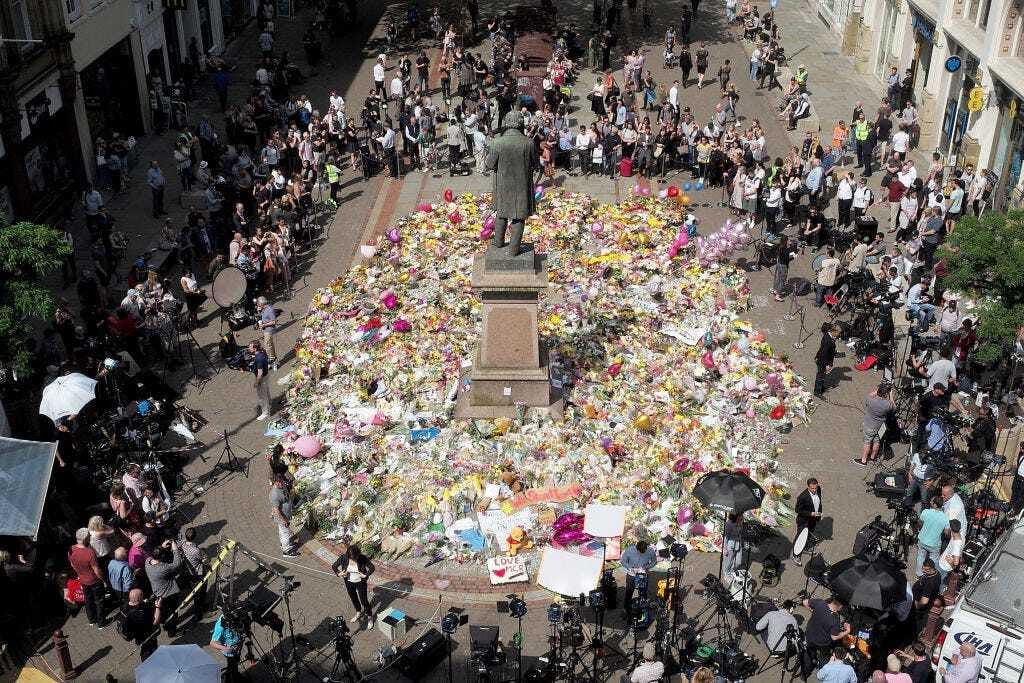Dear readers — welcome to this week’s briefing, which takes a look at the legal action being launched by 250 survivors of the 2017 Manchester Arena attack against MI5. The survivors’ lawyers say the secret service failed to safeguard life, as is its responsibility under the Human Rights Act. “It’s the only way to learn,” one victim’s relative said last year. “Everybody learns by hitting them hard in the pocket.”
Over the weekend, we published a searching piece by Jack about the new rough sleeper encampment that has taken shape on St Peter’s Square over the last few weeks. The piece asks whether the camp’s well-intentioned organisers, originally protesting over the conflict in the Middle East, are actually doing more harm than good. “Thank you for this Jack,” said one member. “Another great example of why I signed up to support the Mill. This is such an incredibly complicated situation for all the reasons you’ve done a good job of setting out.”
This week, we have a piece from contributor Harry Robinson, who wrote this beautiful story about South Manchester’s Kurdish barbers. On Wednesday, he’ll be writing about a new gender-inclusive football league in Hough End. And on Thursday, our cultural editor Sophie Atkinson is reviewing Tales From The Dancefloor. No, not the sweeping 2013 memoir by Strictly Come Dancing judge Craig Revel Horwood, but the new autobiography by Sacha Lord, clubbing impresario and Andy Burnham’s advisor on the night time economy. People often send us their books, but it’s the first time we’ve received one in a box that plays Glue, by the DJ duo Bicep, when you open it. If you want to refresh your memory on Lord, read Jack’s two-part profile of him from last year.
What’s your ‘wild’ place?

From today’s sponsor: Manchester wants to become a 'greener' city that embraces nature, but how can that be achieved given the scale of new development? That’s one of the many questions explored by a fascinating new exhibition called Wild, which opens at Manchester Museum on 5 June. Wild will explore how people are creating and repairing connections with nature, from post-industrial urban landscapes like Manchester to Aboriginal-led cultural revegetation projects in Western Australia and the reintroduction of wolves in Yellowstone National Park in the US.
We’d love you to take part. Just email us a photo and a short description of your favourite “wild” space in the local area, whether it’s the site of an abandoned mill or a lovely spot in your local park. Our favourite ones will be published in future newsletters and you will get a free curator’s tour of the exhibition. Read more about Wild here.
⛅️ This week’s weather
After a rainy and chilly start to the week, there’ll be some lovely sunshine this weekend, with temperatures climbing to the mid teens.
Tuesday 🌤️ Breezy with pleasant spells of sunshine and the odd shower. 13°C.
Wednesday ⛅️ Dry, cloudy and feeling chilly. 11°C.
Thursday 🌦️ Bright spells and light winds with the occasional shower. 12°C.
Friday 🌦️Breezy with occasional sunny intervals and a few showers. 13°C.
Weekend ⛅️ Mostly dry and much milder with variable cloud allowing for sunshine at times.
You can find the latest forecast at Manchester Weather on Facebook — daily forecasts are published at 6.15am.
The big story: Arena survivors become the first to take MI5 to court for not stopping attack
Top line: Survivors of the 2017 Arena Attack are suing MI5, the Sunday Times has revealed. Their lawyers have filed a group claim to the Investigatory Powers Tribunal (IPT), which looks into complaints about the secret service, and believe MI5 failed to take reasonable steps to safeguard life, a responsibility that falls on the state under the Human Rights Act.
This case is one of two being brought by the survivors of the arena attack. The other is a civil case against the police/arena operators.
Context: Salman Abedi killed 22 people and injured hundreds of others when he detonated a homemade bomb at Manchester Arena as people, mainly children, were leaving an Ariana Grande concert. During the two-year inquiry into the attack, the victims’ families heard a “gist” of the evidence given by MI5 over three weeks of secret hearings. In its final report, the inquiry found a “significant opportunity” to prevent the attack was missed.
A “communication breakdown” meant key evidence wasn’t shared between MI5 and counter terrorism police.
The evidence could have led to Abedi being tracked to a car where he was storing the bomb. “The attack might have been prevented,” the report said.
In response, MI5’s director general Ken McCallum said: “To all those whose lives were forever changed on that awful night: I am so sorry that MI5 did not prevent the attack at the Manchester Arena.”

Right to life: This is the first time a group of survivors have taken legal action against the secret services for allegedly failing to stop a terror attack. The three legal firms involved in the case, representing a collective 250 people, say MI5 not stopping the attack breached their clients’ “right to life”.
The lawsuit has been in the works for a while. Last March, families were already looking into the possibility of suing the secret service.
Charlotte Hodgson, the mother of 15-year-old Olivia Campbell-Hardy, who died in the attack, said at the time: “They can’t hide behind being MI5.”
Andrew Roussos, whose eight-year-old daughter Saffie died in the attack, said: “It’s the only way to learn. Everybody learns by hitting them hard in the pocket.”
Pocket pain: The payout could be in the millions, but a legal source told the Times: “This legal action is not about money or compensation, it’s about holding MI5 to account for failing to prevent 22 people dying and many hundreds more being seriously injured.” MI5 have not commented on the legal action.
What this means: MI5 will now have to give the IPT all the evidence it has relating to how the attack and how it could have been stopped. However, one lawyer (who has previously represented people trying to sue MI5) told the Times that getting that evidence is often a “terminal problem” with these cases, because courts usually side with government bodies trying to hold on to confidential information.
Bottom line: The case against MI5 isn’t expected to be heard until next year. If the action succeeds, it will mark a significant change in the relationship between the secret services and the public. The case will be judged on its merits, but anything that incentivises intelligence sharing between agencies — and perhaps prevents something like this happening again — is to be welcomed.
Your Mill briefing
🌹 Angela Rayner is eager to “set out all of the facts" — says shadow home secretary Yvette Cooper — regarding the row over whether she should have paid tax when selling her former council house. The long-running row was given further fuel last Friday after GMP re-opened an investigation over claims Rayner had registered the wrong address on the electoral roll before becoming an MP — which would be a breach of electoral law. Rayner has maintained that she followed the rules, and has vowed to resign if the investigation finds otherwise.
🚆 Astonishingly, the government is still buying properties along the route of the now scrapped Northern Leg of HS2. They’ve spent £1.4m since Rishi Sunak announced the leg wouldn’t be going ahead at last year's Conservative Party Conference. Insiders tell the Guardian it was because the purchases were already being processed and “at a late stage” when the government U-turned on the plans.
🏃 It was the Manchester Marathon yesterday. More than 30,000 runners took part, and more than 125,000 came out to support them. Participants were up 6,000 on last year’s race, with 14,000 people running their first ever marathon. To the marathoners amongst our readership — congratulations! We hope you’re taking some well-deserved rest today, or at least avoiding stairs.
🇮🇷 A new report by the Policy Exchange highlights worrying links between the Islamic Centre of England and a series of protests condemning acts of blasphemy, which could suggest co-ordinated attempts to enforce de facto blasphemy laws in the UK. In one such protest outside Batley Grammar School in West Yorkshire, a teacher was forced into hiding after showing children a drawing of Mohammed. The Islamic Centre of England, which was run by a direct representative of the supreme leader of Iran, had bases in London, Manchester, Birmingham, Newcastle and Glasgow. The report criticises the centre for projecting “soft power and influence” in the UK, and attempting to spread Tehran’s brand of Islam. Know more about this story? Get in touch.
Home of the week

This two-bedroom house sits in a row of terraced houses that line a steep hill in Oldham and has lovely views of the nearby countryside. £105,000.
Our favourite reads
Trevor Griffiths, Marxist Writer for Stage and Screen, Dies at 88 — The New York Times
Trevor Griffiths, a playwright from Ancoats, depicted a Manchester radically different from the one we know today. His most popular play Comedians was staged in London and Broadway and set in a stand-up comedy class, featuring a group of working-class men from Ashton-under-Lyne, who believed they only had one shot at stardom and had to seize it.
When Preachers Were Rock Stars — The New Yorker
The life of nineteenth-century presbyterian minister Henry Ward Beecher harks from a time when sermons were “essentially performance art” that felt “designed to excite, to thrill, to move”. When Beecher gave speeches in Liverpool and Manchester in 1863, he was “violently heckled” for his role as a “leading anti-slavery spokesman”. “Whether because of Beecher’s exertions or not, British trade with the Confederate states largely ceased during the Civil War,” writes Louis Menand.
Gordon Brown: ‘I really didn’t think we could go as far backwards as we’ve gone’ — The Financial Times
Journalist Henry Mance takes a tour of one of Gordon Brown’s “multi-banks”, a spin-off of a food bank, providing essential non-food items. Mance writes that ironically, the man who deserves the most credit for this “Big Society” type of idea is the one that Brown lost the election to — David Cameron. But this latest venture is also a reminder of Brown’s “morally minded, micromanagerial” style as Prime Minister. What would he do if he was Labour leader now? He says he would fight for Labour to shake up the governance of England and “make Manchester, Newcastle, Birmingham, Cardiff [and] Bristol centres of initiative”.
Our to do list
Tuesday
🎨 Memory Stone is a free exhibition at the Lowry by the Iranian artist Nikta Mohammadi that combines elements of science fiction and Iranian mythology. It follows a rambler walking through rural Yorkshire, distracted by dreams and forgotten memories.
🌊 The Garrick Theatre in Stockport is showing The River, a play set in a faraway cabin on a cliff on a moonless night in August, that explores a couple’s efforts to understand each other’s pasts. £11.
Wednesday
🎭 In 2022, So La Flair Theatre were described as the “company worth watching” by the British Theatre Guide for their biting satire of the Kardashians. Now, they’re back with a new show called Is This Thing On?, a study of the fraught friendship between flatmates Mary and Liz. It’s showing at Contact Theatre, get tickets here.
🇵🇹 24-year-old Portuguese composer and singer Rossana, who mixes rock and psychedela, is performing an intimate gig at the Castle in the Northern Quarter. £8.
Thursday
🌸 The RHS Urban Show is a celebration of the growing movement of city gardeners attempting to create an oasis in the midst of urban chaos. Head to Depot Mayfield to see a huge indoor flower show honouring this trend. It’s showing until Saturday and tickets start at £17.
📸 Station South in Levenshulme is showing 20 Year Party People, a new exhibition of photos of Manchester’s party scene, captured on 35mm film.




